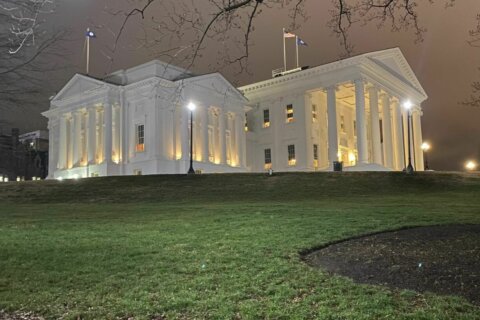Raises for teachers, a mix of pay increases for other Virginia government workers and some significant transportation studies in Northern Virginia are among many pieces of a $135 billion state budget deal revealed Monday afternoon.
These are amendments to Gov. Ralph Northam’s introduced budget, which remains otherwise broadly intact given the unified Democratic control of both chambers, the Executive Mansion and Northam’s decision to leave a pool of money unallocated for the General Assembly’s use.
For example, the budget adopts a proposal to raise the state cigarette tax from 30 cents per pack to 60 cents per pack, double rates on other tobacco products and impose the tax on liquid nicotine (vaping) products.
Among new funding, the budget provides $750,000 per year for the new Virginia Sexual and Domestic Violence Prevention Fund to develop and support programs to prevent sexual and domestic violence with a focus on healthy relationships, sexuality and social-emotional development and to counteract factors tied to sexual and domestic violence.
Lawmakers expect to approve the budget deal Thursday just before adjourning their extended session. The bill then goes to Northam, who has several weeks to review it.
The General Assembly returns April 22 to consider vetoes or amendments from Northam.
Raises
Under the final agreement, teachers and other local school staff would be eligible for 2% raises both this summer and next summer if the school system provides matching funds.
State workers who are employed from April 1 through Nov. 24 would get one-time 3% bonuses in December and colleges could provide those bonuses based on performance.
Local constitutional officers and their full time employees like sheriff’s deputies would get 2% bonuses in December, as would general registrars, Community Services Board workers and similar employees.
State workers, judges, judicial employees and numerous other workers would get 3% raises starting June 10, 2021.
State troopers are expected to get $110 per year of service up to 30 years on August 10, and a 2% raise.
Adjunct faculty at both two-year and four-year colleges would get a 3% base pay increase June 10, 2021.
Most of the raises are contingent on revenues meeting state forecasts.
In another change, the General Assembly eliminated a proposed 2.4% increase in state employee health insurance premiums.
Education
Along with significant required increases in K-12 education funding, the final budget includes funding to keep in-state tuition flat next year at many colleges and universities and funds a free community college or trade school program for low-income students who get degrees in specified high-demand fields.
The “Get Skilled, Get A Job, Give Back Program” proposed by the governor has been amended to cover students with a total household income up to 400% of the poverty level, It also requires students to apply for federal financial aid and make progress toward their degrees.
In all, the program would provide grants to cover tuition, fees and textbooks while also providing up to $2,250 per year to full time students. The payment would be up to $900 per semester — half at the start of the term and half at the end — plus $450 for a summer term, if enrolled.
Degree programs that qualify include health care fields, tech degrees like computer science, education degrees, engineering and design, biology, criminal justice or fire science, homeland security and trades like construction, plumbing and automotive repair.
For other students, Tuition Assistance Grants are set to rise to $3,750 after July 1 and $4,000 on July 1, 2021; online students will also be allowed to get up to $3,400.
Virginia State University will also get funding for a new effort to provide essentially full rides to Virginia students eligible for Pell grants who live in the Richmond and Petersburg areas.
A separate statewide study of college financial aid and tuition discounts aimed at identifying the best way to make college affordable for low- and middle-income students must be done by November.
The budget also funds at least 500 more pre-K slots meant for at-risk students and makes changes to state funding rates for pre-K and K-12 to increase funding for Northern Virginia salaries, where the cost of living is higher than other parts of the state.
Lawmakers are also funding other educational opportunities with $1 million for the American Civil War Museum to expand education for K-12 students and $1.2 million for the Black History Museum and Cultural Center of Virginia to establish traveling and off-site exhibits for K-12 students.
Transportation
The budget accounts for the significant transportation funding increases as part of a broad transportation funding bill approved this weekend, but also includes a number of other provisions that could shape our region’s future.
One study will consider significant improvements for transit services between Franconia-Springfield and Quantico.
There are already plans to improve rush-hour Virginia Railway Express Fredericksburg Line service, but the study has been pitched as a look at extending Metro’s Blue Line into Prince William County.
In reality, the other angle of the study — rapid bus transit along Interstate 95 or Route 1 — is much more likely to come to fruition as a way to serve the growing areas through Fort Belvoir, Lorton, Potomac Mills and Quantico.
A separate study required by the budget will take another look at extending VRE service on the Manassas Line to Gainesville.
For drivers, language in the budget bars the state from charging E-ZPass holders who do not use their transponder for an extended period. VDOT has charged E-ZPass Flex holders a fee if they do not use it in HOV mode.
For Metro riders, Northern Virginia leaders will re-examine the 3% annual cap on Metro operating subsidy increases implemented two years ago amid concerns that it prevents service improvements. Additional service was exempted from the cap for future years under a bill sent to the governor this session, but the study will examine the usefulness of the cap and whether there should be other exceptions.
The budget also accounts for other bills passed this session, like driver privilege cards for undocumented immigrants. The fees from applications are expected to cover all costs for the program, which will create 42 jobs at the Department of Motor Vehicles.
Health care
The budget bills include funding to create Virginia’s health insurance exchange, cover the costs of updating Virginia’s vaccination schedule for kids to current standards for the first time in more than a decade, and expand waiver slots and Medicaid coverage.
Medicaid will now cover adult dental care and the budget also increases reimbursement rates for a variety of medical providers.
The budget also adds $250,000 per year to help sickle cell anemia patients cover costs, prepare for potential expansion of lead testing in schools and provide significant funding to expand permanent supportive housing for people with serious mental health issues.
A separate $7.5 million per year program aims to address overburdened state hospitals in a different way by trialing alternative inpatient mental health treatment options.
The budget does include language overriding a bill that would require insurance cover hearing aids for children. The budget language says the new rule cannot take effect until a further review of potential costs to the state.
Changes around the Capitol
The legislature itself and Capitol Police see significant funding increases in the budget to handle an increased workload.
The budget also identifies $50,000 to add signs around the Capitol Square statue of Gov. Harry F. Byrd Sr. about resistance integrate schools.
General Assembly funding includes replacing the old tracking system for legislation, adding more staff to handle bills. They also added security upgrades.
Capitol Police get additional funding for increased security around the Capitol, financial management, new communications center operations and new fitness equipment in their new headquarters.
General Assembly — extra $2.2 million a year for meetings and operations; $716,790 total to replace old bill tracking system; $1 million total for security and infrastructure upgrades for the legislative automated systems; $750,000 in year two to hire five more people in Division of Legislative Services to deal with workload and staffing.
Gambling
In order to launch sports betting apps, online lottery sales and casinos, the Virginia Lottery gets permission in the budget to borrow money.
Licensing fees will eventually go toward the sports betting and casino oversight operations, which will include more than 100 full time employees.
Elections
The budget prioritizes replacing Virginia’s outdated voter registration database.
Combining state and federal funding, the budget calls for a specific replacement plan by May, with the complete system rollout within two years.
Other notable added studies and investigations
Budget language establishes a number of studies, work groups or other analyses intended to recommend next steps for the state.
That includes creating a commission to investigate last May’s mass shooting in Virginia beach and any challenges in the response.
A $650,000 study will analyze procurement disparities in state government, a $100,000 study will examine inherent bias in the teacher licensing process, and $123,300 per year is allocated to collect and report data on use of force by school resource officers against students.
A similar, larger analysis required by the new Community Policing Act is funded with $4.5 million in the first year and $1.5 million in the second year of the budget to collect data on racial bias and other issues connected to law enforcement. Other commissions will investigate lingering impacts of racial discrimination and examine ways to expand minority business ownership.
The state will also look into paid sick leave for all workers and specifically for personal care attendants, expanding Crisis Intervention Team Assessment Centers to 24/7, and continue to study the impacts of police body cameras.
A study of potential collective bargaining rights for the state’s public employees is due by November, after lawmakers passed a bill this year allowing local governments to opt-in to collective bargaining with their workers.
Other studies include a look at the economic consequences of severe weather threats, an examination of changes that may be needed in state buildings to improve active shooter response, and considering changes for staffing and employment conditions in prisons.






